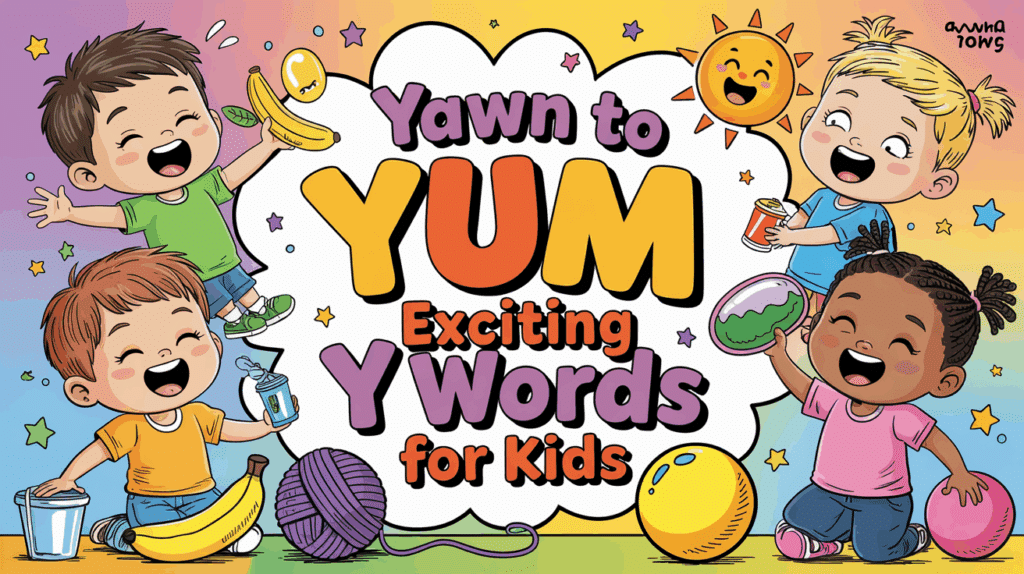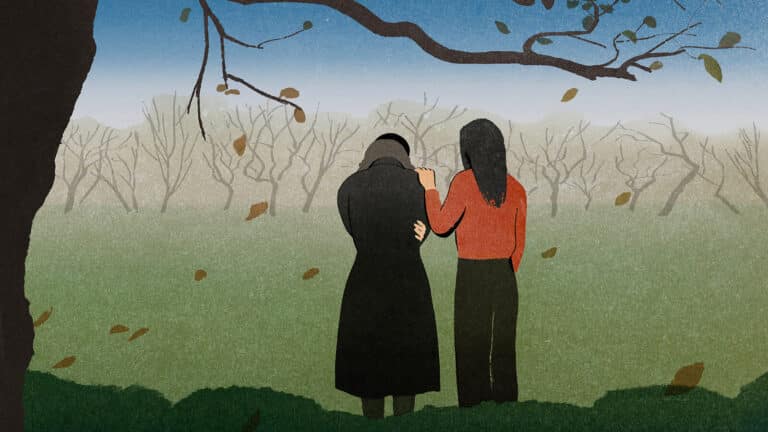Kids often find ‘Y’ words a bit tricky to learn and remember. Many children struggle with limited vocabulary options that start with this letter, making language activities less fun for them.
This blog will show you how simple and enjoyable learning ‘Y’ words can be! We’ve gathered a collection of y words for kids that range from everyday terms to fun, unusual ones they’ll love to say out loud.
In the following sections, age-appropriate ‘Y’ words are organized into categories. You’ll also get tips on how to work these words into games, stories, and daily conversations.
We’ve also included pronunciation guides and descriptions to help kids use these words correctly and confidently.
Why Do Kids Need to Learn New Words?
Words shape how children see and understand the world around them. The letter ‘Y’ often sits quietly in the alphabet lineup, not getting as much attention as its more popular cousins.
But y words for kids carry their special magic in children’s language development. From “yellow” to “yodel,” these words add color and sound to a child’s growing vocabulary.
Here are the reasons why building a strong word bank matters for young minds:
- Brain Development: Learning new words creates neural connections in children’s brains, helping them think more clearly and solve problems better.
- Communication Skills: A bigger vocabulary helps kids express their thoughts, needs, and feelings more accurately and effectively.
- Reading Success: Children who know more words have an easier time understanding what they read, which leads to better school performance.
- Confidence Boost: Being able to use new and interesting words makes kids feel smart and capable during conversations.
- Cultural Understanding: Words connected to different cultures help children appreciate diversity and broaden their worldview.
- Creative Thinking: New words spark imagination and help kids think in fresh, creative ways.
- Social Connections: Sharing the same vocabulary helps children connect with others and make friends more easily.
3-letter: Y Words for Kids
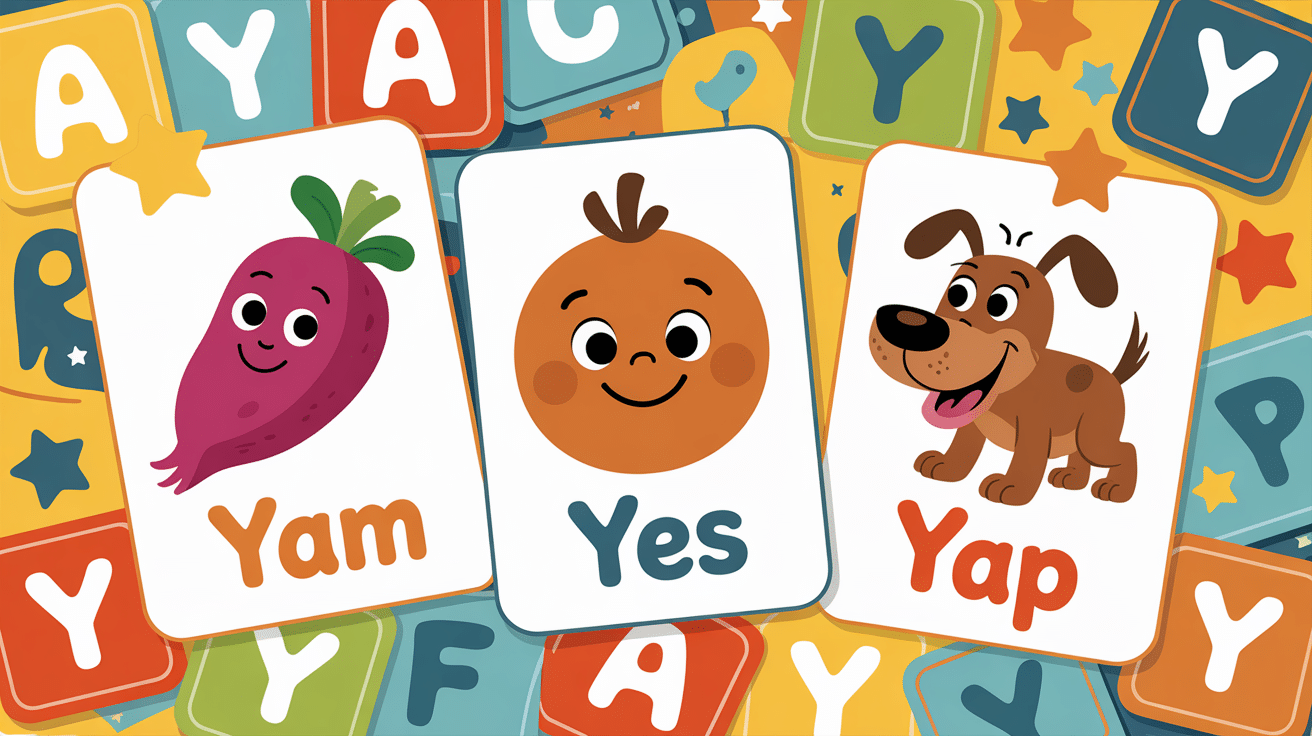
Young kids can start with simple ‘Y’ words that are easy to say and write. Words like “yak,” “yum,” and “yep” are perfect first ‘Y’ words. These short terms help build confidence as children begin to read and speak.
1. Yam
-
Description: A sweet root vegetable often eaten cooked.
-
Pronunciation: /yam/
2. Yes
-
Description: A word used to show agreement or affirmation.
-
Pronunciation: /yes/
3. Yew
-
Description: A type of evergreen tree with red berries.
-
Pronunciation: /yo͞o/
4. Yip
-
Description: A short, high-pitched bark or cry.
-
Pronunciation: /yip/
5. Yaw
-
Description: To turn left or right, especially in a vehicle.
-
Pronunciation: /yô/
6. Yap
-
Description: To bark or talk noisily.
-
Pronunciation: /yap/
7. You
-
Description: Refers to the person being spoken to.
-
Pronunciation: /yo͞o/
8. Yet
-
Description: Up to the present time; still.
-
Pronunciation: /yet/
9. Yin
-
Description: In Chinese philosophy, it’s the dark or passive force.
-
Pronunciation: /yin/
10. Yep
-
Description: An informal way of saying “yes.”
-
Pronunciation: /yep/
11. Yid
-
Description: A Yiddish-speaking Jewish person (used respectfully in culture).
-
Pronunciation: /yid/
12. Yon
-
Description: An old word meaning “over there.”
-
Pronunciation: /yän/
13. Yob
-
Description: A British slang for a rude young man.
-
Pronunciation: /yob/
14. Yuk
-
Description: An exclamation showing disgust.
-
Pronunciation: /yək/
15. Yow
-
Description: An exclamation for surprise or pain.
-
Pronunciation: /you/
16. Yom
-
Description: A Hebrew word meaning “day.”
-
Pronunciation: /yōm/
17. Yip
-
Description: A squeaky sound dogs often make.
-
Pronunciation: /yip/
18. Yew
-
Description: A tree that stays green all year.
-
Pronunciation: /yo͞o/
19. Yay
-
Description: A cheer of excitement or joy.
-
Pronunciation: /yā/
20. Yag
-
Description: Short for “yag laser” used in science.
-
Pronunciation: /yag/
21. Yom
-
Description: Means “day” in Hebrew, like in Yom Kippur.
-
Pronunciation: /yōm/
22. Yow
-
Description: Shouted when something hurts or surprises you.
-
Pronunciation: /you/
23. Yus
-
Description: A slang or playful way to say yes.
-
Pronunciation: /yuhs/
24. Yex
-
Description: An old word meaning to hiccup or belch.
-
Pronunciation: /yeks/
25. Yat
-
Description: A dialect word for a New Orleans native.
-
Pronunciation: /yat/
26. Yoo
-
Description: A fun or exaggerated way to say “you.”
-
Pronunciation: /yo͞o/
27. Yaw
-
Description: When something turns around a vertical axis.
-
Pronunciation: /yô/
28. Yag
-
Description: A short name for a scientific laser type.
-
Pronunciation: /yag/
29. Yeg
-
Description: An old slang for a burglar.
-
Pronunciation: /yeg/
30. Yen
-
Description: A strong desire or craving for something.
-
Pronunciation: /yen/
31. Yaf
-
Description: A playful or made-up word kids use for fun.
-
Pronunciation: /yaf/
Y Words for Kids Consisting of 4 Letters
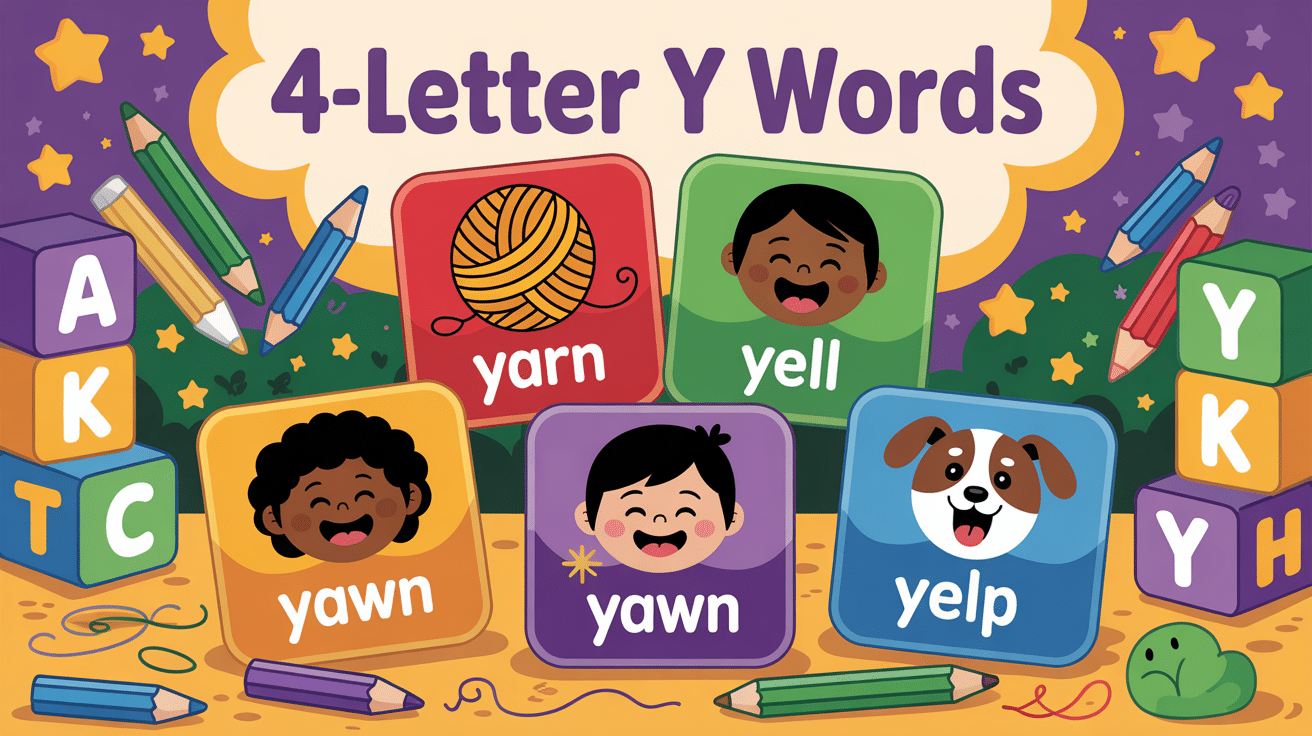
Four-letter ‘Y’ words add more options to a child’s vocabulary. Words such as “yarn,” “yoga,” “yolk,” and “yell” connect to things kids see or do. These words work well in basic sentences and early reading books.
32. Yarn
-
Description: Long thread used for knitting or weaving.
-
Pronunciation: /yärn/
33. Yawn
-
Description: A big breath when tired or bored.
-
Pronunciation: /yôn/
34. Yelp
-
Description: A sharp, high-pitched cry or bark.
-
Pronunciation: /yelp/
35. Yell
-
Description: To shout loudly, often when excited.
-
Pronunciation: /yel/
36. Yuck
-
Description: Said when something is gross or nasty.
-
Pronunciation: /yək/
37. Yule
-
Description: Another name for the Christmas season.
-
Pronunciation: /yo͞ol/
38. Yogi
-
Description: Someone who practices yoga.
-
Pronunciation: /ˈyōɡē/
39. Yang
-
Description: In Chinese belief, it means light or active energy.
-
Pronunciation: /yaNG/
40. Yeti
-
Description: A big, furry creature from snowy mountains.
-
Pronunciation: /ˈye-tē/
41. Yams
-
Description: Sweet root vegetables like potatoes.
-
Pronunciation: /yamz/
42. Yobs
-
Description: British slang for rowdy young people.
-
Pronunciation: /yäbz/
43. Yaps
-
Description: Small, noisy barks made by dogs.
-
Pronunciation: /yaps/
44. Yips
-
Description: Nervousness that causes mistakes, often in sports.
-
Pronunciation: /yips/
45. Yows
-
Description: A sound made in surprise or pain.
-
Pronunciation: /youz/
46. Yoke
-
Description: A wooden bar joining two animals together.
-
Pronunciation: /yōk/
47. Yule
-
Description: Old-fashioned word for Christmas.
-
Pronunciation: /yo͞ol/
48. Yawl
-
Description: A small sailing boat.
-
Pronunciation: /yôl/
49. Ywis
-
Description: An old word meaning certainly or truly.
-
Pronunciation: /ˈi-wəs/
50. Yond
-
Description: An old way to say “over there.”
-
Pronunciation: /yänd/
51. Yagi
-
Description: A type of antenna used in electronics.
-
Pronunciation: /ˈyä-gē/
52. Yair
-
Description: A name or word used in poetry.
-
Pronunciation: /yair/
53. Yaps
-
Description: Talks a lot, often noisily.
-
Pronunciation: /yaps/
54. Yett
-
Description: A Scottish word for a gate.
-
Pronunciation: /yet/
55. Yack
-
Description: To chat or talk a lot.
-
Pronunciation: /yak/
56. Yogi
-
Description: A person skilled in yoga practice.
-
Pronunciation: /ˈyō-ɡē/
57. Yaff
-
Description: A loud laugh or bark sound.
-
Pronunciation: /yaf/
58. Yald
-
Description: A Scottish word meaning bold or strong.
-
Pronunciation: /yôld/
59. Yawn
-
Description: What you do when sleepy or bored.
-
Pronunciation: /yôn/
60. Yogi
-
Description: A calm person who teaches yoga.
-
Pronunciation: /ˈyōɡē/
61. Yirk
-
Description: To move or jerk suddenly.
-
Pronunciation: /yərk/
62. Yuke
-
Description: Scottish word meaning itch or scratch.
-
Pronunciation: /yo͞ok/
63. Yamp
-
Description: Slang for act silly or playful.
-
Pronunciation: /yamp/
64. Yins
-
Description: Slang in Pittsburgh for “you all.”
-
Pronunciation: /yinz/
65. Yote
-
Description: Short slang for a coyote.
-
Pronunciation: /yōt/
66. Yaup
-
Description: To cry out loudly.
-
Pronunciation: /yôp/
67. Yute
-
Description: Slang for youth or young person.
-
Pronunciation: /yo͞ot/
68. Yutz
-
Description: A silly or clumsy person.
-
Pronunciation: /yəts/
69. Yawl
-
Description: Another name for a small sailboat.
-
Pronunciation: /yôl/
70. Yobs
-
Description: British term for badly-behaved boys.
-
Pronunciation: /yäbz/
71. Yegg
-
Description: An old word for a burglar.
-
Pronunciation: /yeg/
72. Yest
-
Description: An old word meaning yeast or froth.
-
Pronunciation: /yest/
73. Yoni
-
Description: A spiritual symbol from India.
-
Pronunciation: /ˈyō-nē/
74. Yite
-
Description: A rare word meaning small bird.
-
Pronunciation: /yīt/
75. Yack
-
Description: Slang for chatting or talking a lot.
-
Pronunciation: /yak/
76. Yeld
-
Description: An old word for barren or not producing.
-
Pronunciation: /yeld/
77. Yerk
-
Description: A sudden movement or twitch.
-
Pronunciation: /yərk/
78. Yowl
-
Description: A long cry of pain or sadness.
-
Pronunciation: /youl/
79. Yowe
-
Description: Scottish word for a female sheep.
-
Pronunciation: /yō/
80. Yarr
-
Description: A pirate-sounding cheer like “yes!”
-
Pronunciation: /yär/
81. Yump
-
Description: A jump over a bump or hill.
-
Pronunciation: /yəmp/
82. Yote
-
Description: Short for coyote, often in slang.
-
Pronunciation: /yōt/
83. Yins
-
Description: A Pittsburgh word for “you all.”
-
Pronunciation: /yinz/
84. Yuck
-
Description: Used when something is gross or icky.
-
Pronunciation: /yək/
85. Ywis
-
Description: A very old word meaning “truly.”
-
Pronunciation: /ˈi-wəs/
86. Yape
-
Description: Rare word for an open mouth.
-
Pronunciation: /yāp/
87. Yald
-
Description: Scottish word for strong or bold.
-
Pronunciation: /yôld/
88. Yeld
-
Description: Not able to produce offspring.
-
Pronunciation: /yeld/
89. Yass
-
Description: Slang cheer meaning “yes!” with excitement.
-
Pronunciation: /yas/
90. Yawl
-
Description: A type of boat with sails.
-
Pronunciation: /yôl/
91. Yegg
-
Description: Old term for a thief or crook.
-
Pronunciation: /yeg/
92. Yous
-
Description: Slang for “you all” or “you guys.”
-
Pronunciation: /yo͞oz/
5-letter: Y Words for Kids
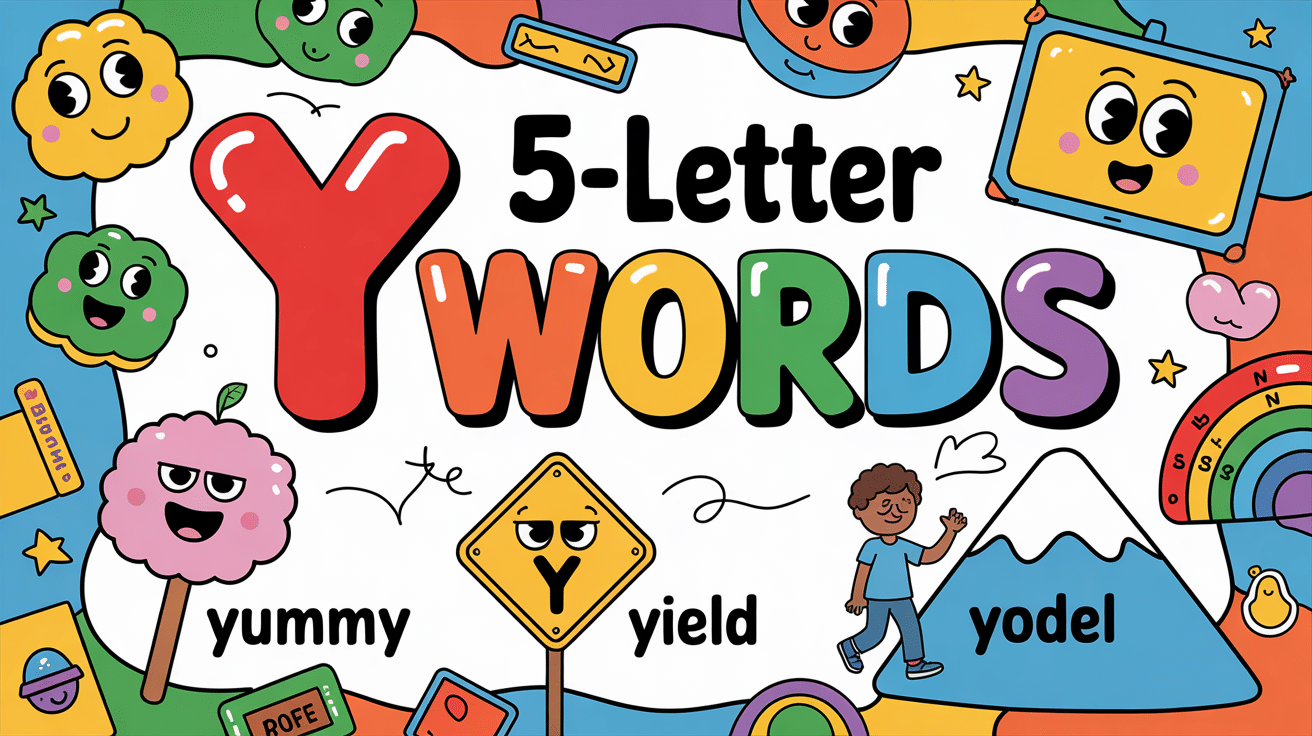
Five-letter ‘Y’ words help kids grow their language skills. “Youth,” “yacht,” “yogurt,” “yield,” and “yearn” introduce more complex ideas. These words can spark good talks about feelings, actions, and things in the world.
93. Yacht
-
Description: A fancy boat used for fun or racing.
-
Pronunciation: /yät/
94. Yearn
-
Description: To really want something deeply.
-
Pronunciation: /yərn/
95. Yells
-
Description: Loud sounds or shouts.
-
Pronunciation: /yelz/
96. Yield
-
Description: To let someone go first or give way.
-
Pronunciation: /yēld/
97. Young
-
Description: Someone who is not old yet.
-
Pronunciation: /yəŋ/
98. Youth
-
Description: A time in life when someone is young.
-
Pronunciation: /yo͞oTH/
99. Yummy
-
Description: Something that tastes really good.
-
Pronunciation: /ˈyəmē/
100. Yerba
-
Description: A kind of plant used in tea.
-
Pronunciation: /ˈyer-bə/
101. Yowie
-
Description: A big, mysterious creature in Australia.
-
Pronunciation: /ˈyowē/
102. Yukky
-
Description: Something gross or unpleasant.
-
Pronunciation: /ˈyəkē/
103. Yanks
-
Description: Pulls something with a quick force.
-
Pronunciation: /yaNGks/
104. Yodel
-
Description: To sing by quickly changing pitches.
-
Pronunciation: /ˈyōdl/
105. Yappy
-
Description: Very talkative or noisy, like a little dog.
-
Pronunciation: /ˈyapē/
106. Yowie
-
Description: A creature like Bigfoot in Aussie stories.
-
Pronunciation: /ˈyowē/
107. Yipes
-
Description: A word said when scared or surprised.
-
Pronunciation: /yīps/
108. Yanks
-
Description: Slang for Americans or sudden pulls.
-
Pronunciation: /yaNGks/
109. Yarks
-
Description: Makes a quick bark or shout.
-
Pronunciation: /yärks/
110. Yeggs
-
Description: Old word for safecrackers or robbers.
-
Pronunciation: /yegs/
111. Yards
-
Description: Open spaces around homes or schools.
-
Pronunciation: /yärdz/
112. Yarns
-
Description: Threads or fun stories.
-
Pronunciation: /yärnz/
113. Yucky
-
Description: Not tasty or not fun—gross!
-
Pronunciation: /ˈyəkē/
114. Yippy
-
Description: Happy and excited, like a cheer.
-
Pronunciation: /ˈyipē/
115. Yerks
-
Description: Quick jerks or movements.
-
Pronunciation: /yərks/
116. Yobbo
-
Description: Slang for a loud or rude person.
-
Pronunciation: /ˈyä-(ˌ)bō/
117. Yules
-
Description: Festive times around Christmas.
-
Pronunciation: /yo͞olz/
118. Yumps
-
Description: Jumps made during racing or running.
-
Pronunciation: /yəmpz/
119. Yakka
-
Description: Australian slang for hard work.
-
Pronunciation: /ˈyakə/
120. Yarks
-
Description: Vomits or gags suddenly.
-
Pronunciation: /yärks/
121. Yales
-
Description: A type of mythical animal.
-
Pronunciation: /yālz/
122. Yente
-
Description: A talkative woman in Yiddish culture.
-
Pronunciation: /ˈyen-tə/
123. Yulan
-
Description: A type of magnolia flower.
-
Pronunciation: /ˈyü-lən/
124. Yowls
-
Description: Loud howls made by animals.
-
Pronunciation: /youlz/
125. Yules
-
Description: Another way to say Christmas times.
-
Pronunciation: /yo͞olz/
126. Yawed
-
Description: Turned side to side like a boat.
-
Pronunciation: /yôd/
127. Yirds
-
Description: A rare Scottish word for earth or ground.
-
Pronunciation: /yərdz/
128. Yarks
-
Description: Makes a short loud sound.
-
Pronunciation: /yärks/
129. Yojan
-
Description: An old Indian unit of distance.
-
Pronunciation: /ˈyō-jən/
130. Yacko
-
Description: A silly or chatty person.
-
Pronunciation: /ˈyakō/
131. Yexed
-
Description: Made a hiccup sound.
-
Pronunciation: /yekst/
132. Yokes
-
Description: Wooden bars joining animals together.
-
Pronunciation: /yōks/
133. Yodle
-
Description: A fun version of the word yodel.
-
Pronunciation: /ˈyōdl/
134. Yills
-
Description: Yells or loud calls.
-
Pronunciation: /yilz/
135. Yirds
-
Description: Means ground in old Scottish.
-
Pronunciation: /yərdz/
136. Yowza
-
Description: A fun word for wow or excitement.
-
Pronunciation: /ˈyow-zə/
137. Yocks
-
Description: Loud laughs or chuckles.
-
Pronunciation: /yäks/
138. Yobby
-
Description: Rude or noisy, like a yob.
-
Pronunciation: /ˈyäbē/
139. Yesty
-
Description: Full of energy, like yeast rising.
-
Pronunciation: /ˈyestē/
140. Yobbs
-
Description: British slang for wild boys.
-
Pronunciation: /yobs/
141. Yipes
-
Description: A sound you make when startled.
-
Pronunciation: /yīps/
142. Yacks
-
Description: Talks and talks a lot.
-
Pronunciation: /yaks/
143. Yappy
-
Description: Very talkative, often about nothing.
-
Pronunciation: /ˈyapē/
144. Yugas
-
Description: Long time periods in Hindu tradition.
-
Pronunciation: /ˈyo͞o-gəz/
145. Yodle
-
Description: A playful way of saying yodel.
-
Pronunciation: /ˈyōdl/
146. Yance
-
Description: To yawn or stretch lazily.
-
Pronunciation: /yans/
147. Yourn
-
Description: Old word for “yours.”
-
Pronunciation: /yôrn/
148. Yowie
-
Description: A legendary creature like Bigfoot.
-
Pronunciation: /ˈyowē/
149. Yento
-
Description: A word for a busybody woman.
-
Pronunciation: /ˈyen-tō/
Common Mistakes to Avoid When Teaching Y Words
Learning the letter ‘Y’ can be both fun and challenging for children. Teachers and parents often face unique hurdles when introducing ‘Y’ words to young learners.
The letter’s dual role as both a consonant and sometimes a vowel adds an extra layer of complexity.
The following are some common mistakes to avoid when teaching the Y word:
- Confusing Y as a Vowel and Consonant: Many adults forget to explain that ‘Y’ sometimes acts as a vowel (as in “sky” or “happy”) and sometimes as a consonant (as in “yellow” or “yak”).
- Overlooking Pronunciation Patterns: Not pointing out that ‘Y’ at the end of words often makes a long ‘E’ sound (like in “candy” or “baby”) or a long ‘I’ sound (like in “fly” or “my”).
- Limited Word Examples: Sticking only to obvious examples like “yellow” and “yo-yo” instead of introducing varied words across different contexts.
- Ignoring Word Families: Failing to show how ‘Y’ words can belong to word families that help with pattern recognition (like -ay words: day, say, way).
- Missing Real-World Connections: Not connecting ‘Y’ words to things children can see, touch, or experience in their daily lives.
- Skipping Visual Aids: Teaching ‘Y’ words without pictures or objects, when visual connections significantly help memory retention.
- Inconsistent Practice: Not providing enough opportunities to practice newly learned ‘Y’ words in different situations.
Wrapping It Up
Y words for kids offer a special opportunity for children to grow their language skills. From simple three-letter words like “yak” to more complex terms, each new word adds a valuable tool to a child’s communication toolkit.
Remember that learning happens best through play and real-life experiences. When kids connect words with things they can see and touch, those words stick in their minds more easily.
By avoiding common teaching mistakes and making word learning fun, parents and teachers can help children master ‘Y’ words with confidence. The goal isn’t perfect spelling or pronunciation right away, but rather building curiosity about language.
As children grow their ‘Y’ word collection, they gain more than just vocabulary; they develop stronger reading, writing, and speaking skills that will serve them throughout their lives.

